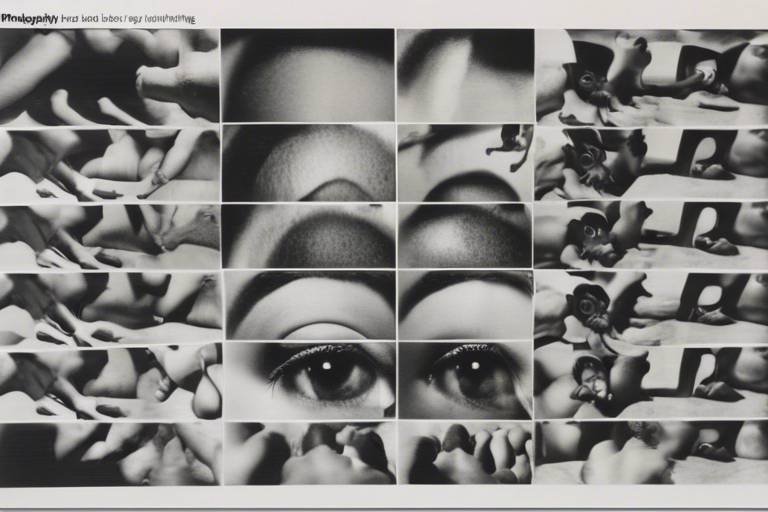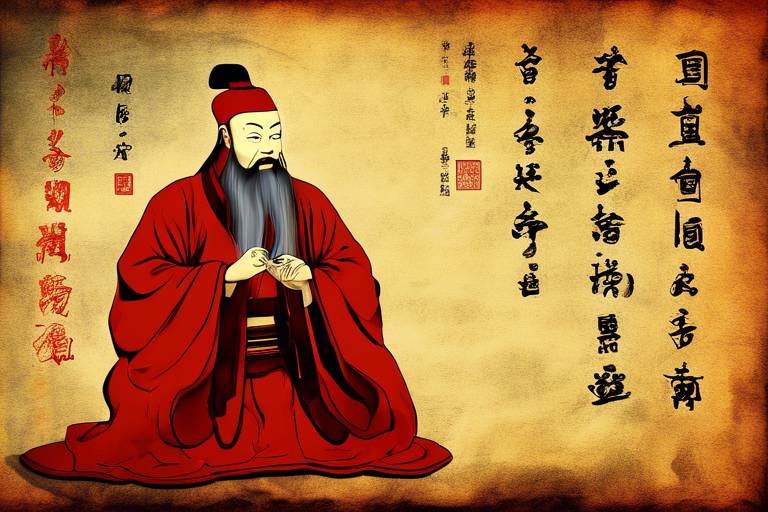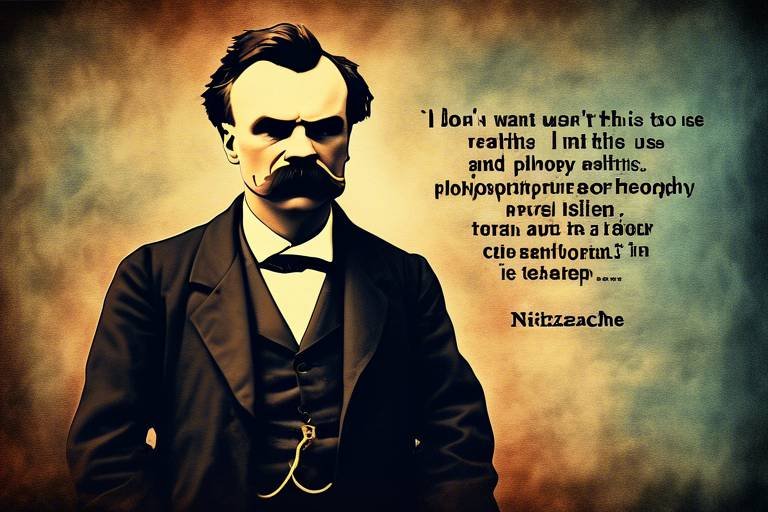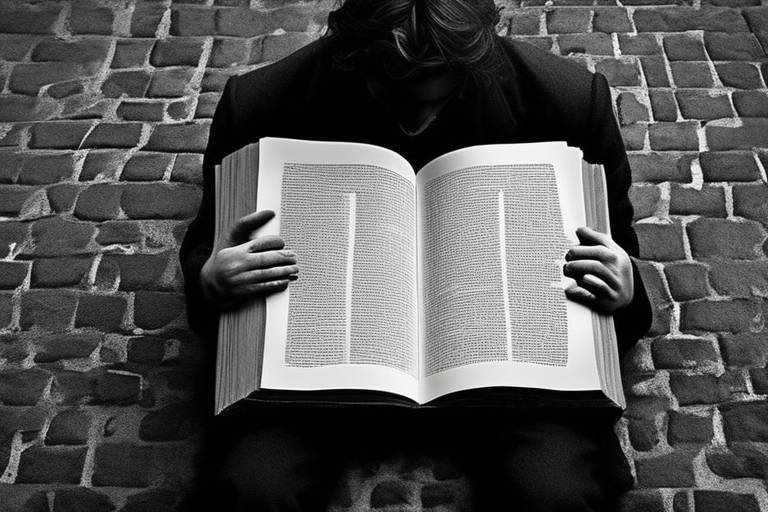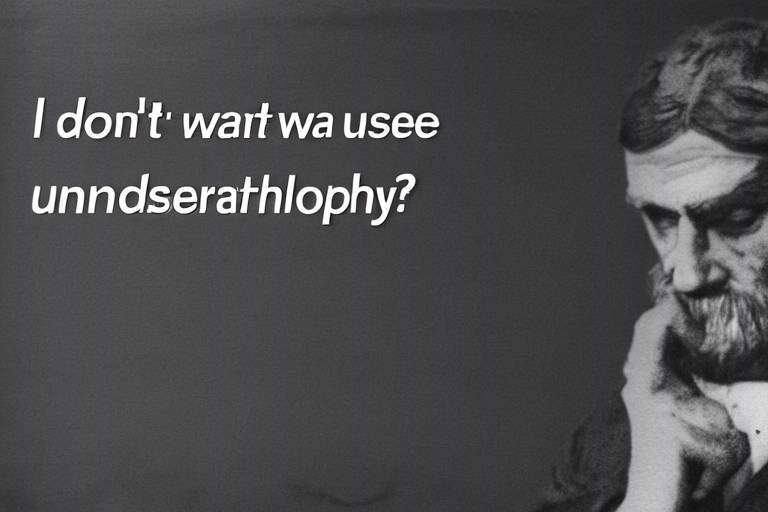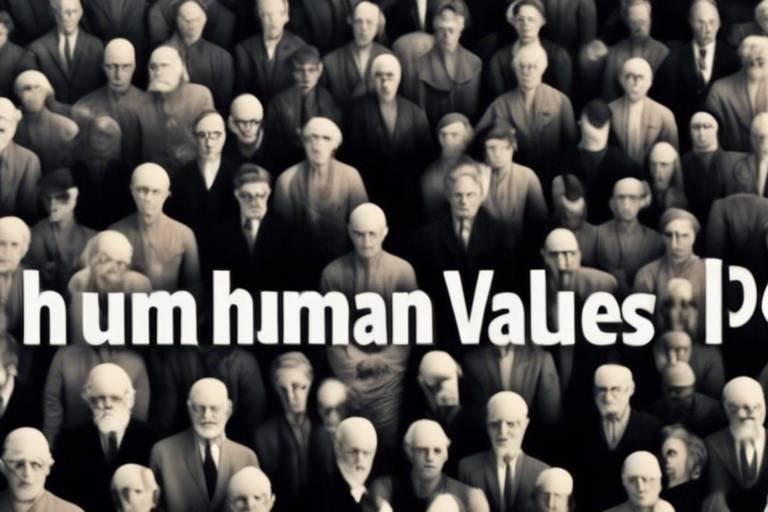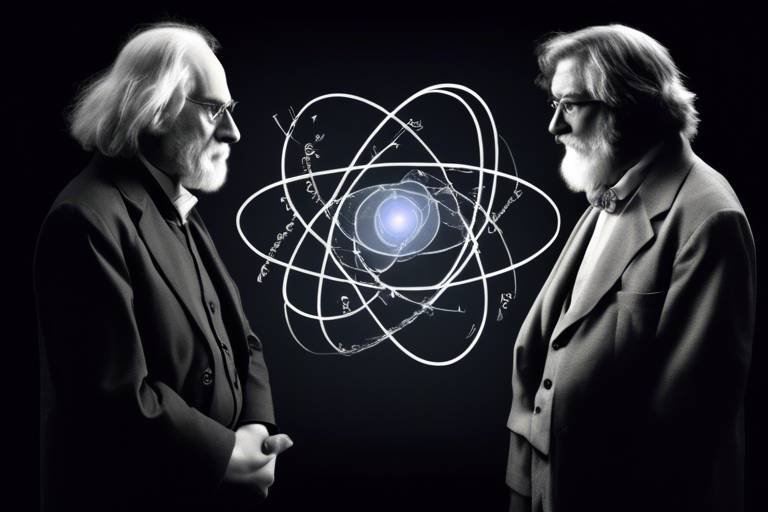Anxiety - A Philosophical Approach
Anxiety is one of those experiences that can feel like a relentless shadow, lurking just out of sight, yet always present. It's a feeling that many of us are all too familiar with, but when we stop to consider its deeper implications, we can start to see it in a new light. This article explores anxiety through a philosophical lens, examining its origins, implications, and potential resolutions. We will delve into various philosophical perspectives that can help us understand and cope with anxiety, transforming our relationship with it from one of fear to one of insight.
Understanding what anxiety truly is can provide insight into its complexities. At its core, anxiety is an emotional response to perceived threats, whether real or imagined. It manifests in various forms, from mild unease to debilitating panic. The characteristics of anxiety can vary widely, but common experiences include racing thoughts, physical sensations like a racing heart, and a sense of impending doom. It's almost as if anxiety is a warning signal, alerting us to potential dangers, but often it goes off when there is no real threat, causing confusion and distress.
This pervasive presence in human life begs the question: why do we experience anxiety so frequently? Perhaps it is a survival mechanism, a remnant of our evolutionary past where being alert to danger was essential for survival. However, in today's world, where threats are often more abstract and less tangible, anxiety can become a constant companion, leading to a cycle of worry and fear that can be hard to break.
Philosophers throughout history have contemplated anxiety, offering insights that still resonate today. Thinkers like Søren Kierkegaard and Martin Heidegger approached the subject with a depth that reveals the existential weight of anxiety. For Kierkegaard, anxiety was a fundamental aspect of human existence, a sign of our freedom and the choices we face. In contrast, Heidegger viewed anxiety as a confrontation with our own mortality, a reminder of our finite nature.
These historical perspectives highlight that anxiety is not merely a modern phenomenon but a profound aspect of the human condition. The reflections of these philosophers encourage us to engage with our anxiety rather than shy away from it, suggesting that in doing so, we may uncover deeper truths about ourselves and our existence.
Existentialist philosophy offers a unique perspective on anxiety, viewing it as a fundamental aspect of the human condition. For existentialists, anxiety arises from the awareness of our freedom and the weight of our choices. It’s as if we are standing at a crossroads, with countless paths before us, each leading to different outcomes. The pressure to choose can be overwhelming, and this is where anxiety often takes root.
The connection between anxiety, freedom, and responsibility is profound. With freedom comes the burden of choice, and this realization can lead to feelings of anxiety and existential dread. Imagine standing at the edge of a vast canyon, where each step forward represents a decision that could alter your life’s trajectory. The fear of making the wrong choice can be paralyzing, leading us to question our own judgment and capabilities.
Amidst this struggle, the concept of authenticity emerges as a crucial element in navigating anxiety. The pressure to conform to societal expectations can amplify feelings of anxiety, as we often find ourselves torn between our true selves and the personas we feel compelled to adopt. The quest for authenticity is about staying true to oneself, even when the world around us seems to demand otherwise. This internal conflict can be a significant source of anxiety, but embracing our authentic selves can also lead to profound personal growth and resilience.
Stoic philosophy provides practical tools for managing anxiety, focusing on what is within our control. The Stoics teach us to reframe our thoughts, emphasizing that while we cannot control external events, we can control our responses to them. This perspective encourages us to cultivate a sense of calm amidst chaos, allowing us to navigate our anxious thoughts with greater ease.
Mindfulness practices, rooted in both philosophy and psychology, can significantly impact anxiety management. By cultivating awareness and acceptance, mindfulness helps individuals navigate their anxious thoughts and feelings. It’s like learning to ride the waves of anxiety instead of being swept away by them. When we practice mindfulness, we become observers of our thoughts rather than participants, allowing us to create space between ourselves and our anxiety.
Exploring the philosophical roots of mindfulness reveals connections between Eastern philosophies and Western thought. Both traditions emphasize the importance of being present and accepting our experiences without judgment. This intersection of ideas illustrates how mindfulness can serve as a bridge between different philosophical perspectives, offering a holistic approach to managing anxiety.
Anxiety can often feel overwhelming, but it can also serve as a catalyst for personal growth. By embracing anxiety, we can delve deeper into our inner selves, uncovering insights that might have remained hidden otherwise. This process of exploration can lead to a greater understanding of our values, desires, and fears, ultimately helping us to find meaning in our experiences.
There are countless stories of individuals who have transformed their anxiety into a source of strength. These transformative experiences often serve as powerful reminders that confronting our fears can lead to positive change. Just as a caterpillar must struggle to break free from its cocoon, so too can we emerge from our own struggles with anxiety, stronger and more resilient than before.
- What is anxiety? Anxiety is an emotional response to perceived threats, characterized by feelings of unease and apprehension.
- How can philosophy help in understanding anxiety? Philosophy provides frameworks for exploring the deeper meanings and implications of anxiety, helping us to engage with it more constructively.
- What are some practical techniques for managing anxiety? Techniques such as mindfulness and Stoic reframing can be effective in managing anxiety by focusing on what is within our control.
- Can anxiety lead to personal growth? Yes, embracing anxiety can lead to deeper self-understanding and personal growth, turning a challenging experience into a source of strength.

The Nature of Anxiety
Understanding what anxiety truly is can provide profound insight into its complexities. At its core, anxiety is a natural response to stress, characterized by feelings of worry, nervousness, or fear about an impending event or situation. It can manifest in various ways, from a mild sense of unease to overwhelming panic attacks. Imagine standing on the edge of a diving board, heart racing, contemplating the leap. That moment captures the essence of anxiety—it's a blend of anticipation and fear, a dance between courage and hesitation.
Anxiety isn't just a fleeting emotion; it's a pervasive presence in human life. In fact, studies suggest that nearly 30% of adults will experience an anxiety disorder at some point in their lives. But what makes anxiety so universal? The answer lies in its roots. Anxiety often arises from our instinctual need to protect ourselves. It's a primal response, honed over millennia, designed to alert us to potential dangers. Just as a deer freezes at the sound of a rustling bush, we too can find ourselves immobilized by the weight of our worries.
Common experiences associated with anxiety include:
- Physical Symptoms: Rapid heartbeat, sweating, trembling, and fatigue.
- Cognitive Symptoms: Constantly overthinking, difficulty concentrating, and racing thoughts.
- Emotional Symptoms: Feelings of dread, irritability, and a sense of impending doom.
But why does anxiety feel so isolating? It often thrives in silence, and many people suffer in solitude, thinking they are the only ones grappling with these feelings. This perception can amplify anxiety, creating a vicious cycle. However, acknowledging anxiety as a shared human experience can be liberating. It allows us to connect with others, fostering empathy and understanding. Just like a stormy sea, anxiety can be turbulent, but it can also lead to calmer waters if navigated with the right tools.
In essence, anxiety is not merely a foe to be vanquished but a complex companion that invites us to explore our inner landscapes. By understanding its nature, we can begin to unravel its hold on us. This journey of exploration often leads to deeper self-awareness and ultimately, to a more fulfilling life. So, the next time anxiety creeps in, instead of resisting it, consider embracing it as a signal—a call to examine what truly matters in your life.

Historical Perspectives on Anxiety
Throughout the ages, anxiety has been a topic of profound contemplation among philosophers, each contributing their unique insights and interpretations. From the existential musings of Søren Kierkegaard to Martin Heidegger's exploration of being, the philosophical discourse surrounding anxiety reveals much about the human condition. These thinkers have not only examined the roots of anxiety but also its implications for our understanding of existence itself.
Kierkegaard, often regarded as the father of existentialism, viewed anxiety as a natural consequence of human freedom. He famously described it as a "dread of freedom," suggesting that the very ability to make choices can lead to a paralyzing sense of responsibility. This perspective invites us to ponder: how does the freedom to choose shape our experiences of anxiety? For Kierkegaard, this anxiety is not merely a negative feeling but a vital part of our journey toward self-discovery and authenticity.
In contrast, Heidegger approached anxiety through the lens of being. He posited that anxiety reveals our fundamental state of existence, exposing the "nothingness" that underlies our lives. This existential anxiety, according to Heidegger, is a wake-up call, urging us to confront our mortality and the transient nature of life. By acknowledging this anxiety, we can begin to embrace the freedom that comes with understanding our place in the world. In this sense, anxiety can be seen as a catalyst for deeper reflection and personal growth.
To further illustrate these philosophical perspectives, consider the following table that highlights key thinkers and their contributions:
| Philosopher | Key Concept | Implication for Anxiety |
|---|---|---|
| Søren Kierkegaard | Dread of Freedom | Anxiety arises from the burden of choice and responsibility. |
| Martin Heidegger | Being and Nothingness | Anxiety reveals our existential state and the transient nature of life. |
| Friedrich Nietzsche | Will to Power | Anxiety can be transformed into a driving force for personal growth. |
Moreover, the existentialist perspective on anxiety has paved the way for modern discussions about mental health. Today, we often hear about the importance of acknowledging and confronting our anxieties rather than suppressing them. This shift in thinking aligns closely with the philosophical insights of Kierkegaard and Heidegger, suggesting that our struggles with anxiety are not just personal battles but shared experiences that connect us as human beings.
In conclusion, the historical perspectives on anxiety provided by philosophers like Kierkegaard and Heidegger reveal a rich tapestry of thought that continues to resonate today. By examining anxiety through these philosophical lenses, we can gain a deeper understanding of its complexities and its role in shaping our existence. As we navigate our own experiences of anxiety, let us remember that it is not merely a foe to be vanquished but a profound aspect of our humanity that invites us to explore the depths of our being.

Existentialism and Anxiety
Existentialism, a philosophical movement that emerged in the 20th century, shines a light on the complexities of human existence, particularly the feelings of anxiety that can arise from our inherent freedom and the choices we face. At its core, existentialism posits that individuals are responsible for giving their own lives meaning amidst an indifferent universe. This perspective inherently intertwines with anxiety, as the freedom to make choices can often feel like a double-edged sword. On one hand, it grants us the ability to shape our destinies; on the other, it burdens us with the weight of responsibility and the fear of making the wrong choices.
Philosophers like Søren Kierkegaard and Martin Heidegger have delved deep into this interplay between freedom and anxiety. Kierkegaard, often considered the father of existentialism, famously asserted that anxiety is the "dizziness of freedom," a sensation that arises when one confronts the vast array of possibilities life presents. This anxiety is not merely a symptom to be avoided; rather, it is an essential part of the human experience that can lead to profound self-awareness and personal growth. In this sense, anxiety can serve as a catalyst for introspection, prompting us to examine our values, desires, and the authenticity of our choices.
Heidegger took this exploration further by linking anxiety to the concept of 'Being.' He argued that when we confront our own existence and the inevitability of death, we experience a unique form of anxiety that reveals the authentic self. This existential dread, while uncomfortable, can push individuals to seek a more authentic life, one that aligns with their true selves rather than societal expectations. The struggle between conforming to external pressures and staying true to oneself can be a significant source of anxiety, highlighting the tension between personal freedom and societal norms.
In essence, existentialist philosophy encourages us to embrace our anxiety rather than flee from it. By recognizing anxiety as a natural response to the freedom of choice, we can begin to reframe our understanding of it. Instead of viewing anxiety solely as a negative experience, we can see it as an opportunity for growth. The existentialist viewpoint suggests that through confronting our fears and uncertainties, we can cultivate a deeper sense of authenticity and purpose in our lives.
Ultimately, existentialism teaches us that while anxiety may feel overwhelming, it also serves a vital role in our journey towards self-discovery and meaning. By understanding the roots of our anxiety and the freedom that accompanies our choices, we can learn to navigate the complexities of existence with greater confidence and clarity.
- What is the main idea of existentialism? Existentialism focuses on individual freedom, choice, and the search for meaning in an indifferent universe.
- How does anxiety relate to existentialism? Anxiety arises from the burden of freedom and the responsibility of making choices, prompting individuals to confront their existence and seek authenticity.
- Can anxiety be beneficial? Yes, anxiety can serve as a catalyst for personal growth and self-awareness, encouraging individuals to reflect on their values and choices.

Freedom and Responsibility
When we talk about freedom and responsibility, we're diving into a complex relationship that can often leave us feeling anxious. Imagine standing at a crossroads, with countless paths stretching out before you. Each choice you make not only shapes your future but also carries the weight of responsibility. This is where anxiety often creeps in, whispering doubts into our minds. The freedom to choose is exhilarating, yet it can be paralyzing when we consider the potential consequences of our decisions.
Philosophers like Søren Kierkegaard and Martin Heidegger have explored this intricate dance between freedom and responsibility. Kierkegaard famously posited that the essence of human existence lies in the individual's ability to make choices, which inherently brings about the anxiety of responsibility. He believed that the more freedom we possess, the more we are burdened by the weight of our decisions. This idea resonates deeply in our modern lives, where the pressure to make the 'right' choice can lead to a profound sense of dread.
Heidegger, on the other hand, approached the topic from the angle of being. He suggested that our awareness of mortality and the transient nature of life can amplify our anxiety. The freedom to exist authentically in the world comes with the responsibility to confront our choices and their implications. This existential awareness can be both liberating and terrifying, as it forces us to acknowledge that we are the architects of our destinies.
To illustrate this further, consider the following points that highlight the connection between freedom, responsibility, and anxiety:
- Choice and Consequence: Every decision we make can lead to a multitude of outcomes, and the fear of making the wrong choice can be paralyzing.
- Existential Dread: The realization that we are ultimately responsible for our lives can lead to feelings of anxiety, especially when faced with significant life changes.
- Social Pressures: Society often imposes expectations on what choices we should make, adding another layer of anxiety as we strive to meet these standards.
In the face of such anxiety, it is crucial to recognize that while we have the freedom to choose, we also possess the agency to redefine our understanding of responsibility. Instead of viewing it as a burden, we can embrace it as an opportunity for growth. By reframing our perspective, we can transform the anxiety that arises from our choices into a source of empowerment. This shift in mindset allows us to navigate our lives with a greater sense of purpose and clarity.
Ultimately, the interplay between freedom and responsibility is a fundamental aspect of the human experience. While it may invoke anxiety, it also offers a chance to explore who we truly are and what we value. By facing our choices head-on, we can cultivate a deeper understanding of ourselves and learn to embrace the uncertainties that life presents.
- What is the relationship between freedom and anxiety?
Freedom can lead to anxiety because the more choices we have, the more responsibility we bear for the outcomes of those choices. - How can I manage anxiety related to decision-making?
Practicing mindfulness and reframing your perspective on responsibility can help mitigate anxiety when making decisions. - Are there philosophical approaches to understanding anxiety?
Yes, existentialism and stoicism are two philosophical frameworks that offer insights into the nature of anxiety and how to cope with it effectively.

Authenticity in the Face of Anxiety
In a world that often demands conformity, the struggle for authenticity can feel like a daunting task, especially when anxiety looms large. Imagine standing at a crossroads, where one path leads to societal expectations and the other to your true self. This metaphorical journey is fraught with anxiety, as the pressure to fit in can clash with our innermost desires. The question arises: how do we remain authentic when the weight of the world seems to bear down on us?
Authenticity, at its core, is about being true to oneself. It's about embracing our unique quirks, interests, and values, even when they diverge from the norm. Yet, anxiety can create a powerful dissonance between who we are and who we feel we should be. This dissonance often manifests as a fear of judgment or rejection, leading to a cycle of self-doubt that can be paralyzing. The irony is that the more we try to conform, the more anxiety we often feel. It's as if we are wearing a mask that grows heavier with each passing day.
To navigate this complex landscape, we must first acknowledge our anxiety as a natural response to the pressures of modern life. By doing so, we can begin to dismantle the barriers that inhibit our authenticity. Here are some steps to consider:
- Self-Reflection: Take time to explore your values and passions. Journaling can be a powerful tool in uncovering what truly matters to you.
- Accept Imperfection: Understand that nobody is perfect. Embracing your flaws can liberate you from the fear of judgment.
- Seek Support: Surround yourself with individuals who value authenticity. Their encouragement can help you feel more secure in expressing your true self.
Moreover, authenticity is not just about self-expression; it also involves taking responsibility for our choices. When we act in alignment with our true selves, we often experience a profound sense of freedom. However, this freedom comes with the weight of responsibility, which can further exacerbate feelings of anxiety. It's a delicate balance—one that requires constant recalibration.
Ultimately, the journey toward authenticity is not a linear path. It is filled with ups and downs, moments of clarity, and times of confusion. Yet, embracing this journey can lead to greater resilience against anxiety. When we allow ourselves to be vulnerable and true, we create a space for genuine connection with others, which can significantly alleviate feelings of isolation often associated with anxiety.
In conclusion, authenticity in the face of anxiety is about courage. It's about daring to be yourself in a world that often pressures you to be someone else. By acknowledging your anxiety and actively working toward authenticity, you can transform your experiences into a source of strength, ultimately leading to a more fulfilling life.

Stoicism and Coping with Anxiety
Stoicism, an ancient Greek philosophy, offers profound insights into the nature of anxiety and provides practical tools for coping with it. At its core, Stoicism teaches us that while we cannot control external events, we can control our reactions to them. This fundamental tenet is especially relevant in today’s fast-paced world, where feelings of anxiety can often feel overwhelming. By adopting a Stoic mindset, individuals can learn to navigate their anxious thoughts and feelings with greater ease.
One of the key principles of Stoicism is the distinction between what is within our control and what is not. This distinction is crucial for managing anxiety. When we focus on things we cannot change—like the actions of others or unforeseen circumstances—we often find ourselves spiraling into worry and fear. However, Stoicism encourages us to redirect our energy towards our own thoughts, beliefs, and actions. By doing so, we can cultivate a sense of empowerment and reduce the grip of anxiety on our lives.
For instance, when faced with a stressful situation, a Stoic would ask themselves: “What can I control in this situation?” This question helps to clarify the path forward. Instead of getting bogged down by the uncertainty of outcomes, Stoics focus on their responses. They practice reframing their thoughts, which is a powerful technique for alleviating anxiety. Here’s how it works:
| Situation | Initial Thought | Reframed Thought |
|---|---|---|
| Job Interview | “I might fail and embarrass myself.” | “I can only do my best; the outcome is beyond my control.” |
| Public Speaking | “Everyone will judge me.” | “I am sharing my knowledge; their opinions do not define my worth.” |
This simple practice of reframing can shift our perspective dramatically, allowing us to approach anxiety-inducing situations with a sense of calm and clarity. Additionally, Stoicism emphasizes the importance of acceptance. Accepting that anxiety is a part of the human experience can reduce the shame or fear we might feel about our anxiety. Instead of fighting against it, we can acknowledge its presence and choose how to respond. This acceptance is not about resignation; rather, it is about recognizing our feelings without being dominated by them.
Moreover, Stoics advocate for the practice of negative visualization, a technique that involves imagining the worst-case scenario. While this may sound counterintuitive, it can actually help reduce anxiety. By confronting our fears head-on and imagining what life would be like if our worst fears came true, we often realize that we are more resilient than we think. This practice can lead to a greater appreciation for what we have in the present moment, further alleviating feelings of anxiety.
In summary, Stoicism provides a robust framework for coping with anxiety. By focusing on what we can control, reframing our thoughts, practicing acceptance, and using techniques like negative visualization, we can transform our relationship with anxiety. It’s not about eliminating anxiety completely; rather, it’s about learning to live with it in a way that allows us to thrive. As we embrace these Stoic principles, we can find a sense of peace amidst the chaos of life.
- What is the primary focus of Stoicism in relation to anxiety? Stoicism teaches individuals to focus on what they can control and to accept what they cannot, which helps in managing anxiety.
- How does reframing thoughts help with anxiety? Reframing helps shift our perspective from negative to more constructive thoughts, reducing feelings of anxiety.
- What is negative visualization and how does it work? Negative visualization involves imagining the worst-case scenario to confront fears and build resilience, often leading to a greater appreciation for the present.

The Role of Mindfulness
In a world that often feels like it's spinning out of control, mindfulness emerges as a beacon of hope for those grappling with anxiety. But what exactly is mindfulness? At its core, mindfulness is the practice of being fully present in the moment, allowing individuals to observe their thoughts and feelings without judgment. This practice invites a sense of calm and clarity, creating a space where anxiety can be acknowledged but not allowed to dominate one's existence. Imagine standing on the shore of a vast ocean, waves of anxiety crashing down around you; mindfulness is the surfboard that helps you ride those waves instead of being overwhelmed by them.
Research has shown that mindfulness can significantly reduce symptoms of anxiety, providing tools to navigate the tumultuous waters of our minds. By cultivating a heightened awareness of our thoughts and emotions, we can begin to recognize patterns that contribute to our anxiety. Instead of being swept away by feelings of dread or worry, we learn to observe them with a sense of detachment. This shift in perspective can be transformative, allowing us to respond to our anxiety rather than react to it impulsively.
Mindfulness practices can take many forms, from meditation and breathing exercises to mindful walking and eating. Each of these practices encourages individuals to focus their attention on the present moment, fostering a sense of peace and acceptance. For instance, during a mindfulness meditation session, one might focus on their breath, noticing the rise and fall of their chest. As thoughts of anxiety arise, instead of pushing them away, practitioners learn to acknowledge them and let them pass, much like clouds drifting across a clear blue sky. This acceptance is key to managing anxiety effectively.
Moreover, mindfulness is not just about individual practice; it can also enhance our relationships and interactions with others. When we approach conversations with mindfulness, we become more attuned to the feelings and needs of those around us. This can lead to deeper connections and a greater sense of community, which can be incredibly beneficial for those struggling with anxiety. After all, feeling understood and supported can alleviate some of the burdens that anxiety brings.
To illustrate the impact of mindfulness on anxiety management, consider the following table that outlines the benefits of incorporating mindfulness into daily life:
| Benefit | Description |
|---|---|
| Reduced Stress | Mindfulness helps lower cortisol levels, reducing overall stress. |
| Enhanced Focus | Practicing mindfulness improves concentration and cognitive flexibility. |
| Emotional Regulation | Mindfulness fosters better control over emotions, reducing anxiety spikes. |
| Improved Relationships | Being present enhances empathy and communication with others. |
In conclusion, embracing mindfulness can be a game-changer for those dealing with anxiety. By learning to be present, we can cultivate a sense of peace amidst the chaos of our thoughts. It’s like finding a hidden oasis in a desert; with practice, we can return to this oasis whenever we feel overwhelmed. So, why not give mindfulness a try? You might just discover a new way to navigate the complexities of anxiety, transforming it from a source of fear into a pathway for growth and self-discovery.
- What is mindfulness? Mindfulness is the practice of being present and fully engaged in the current moment, without judgment.
- How can mindfulness help with anxiety? Mindfulness allows individuals to observe their anxious thoughts and feelings without being overwhelmed by them, promoting emotional regulation and reducing stress.
- What are some mindfulness practices? Common practices include meditation, mindful breathing, and mindful walking.
- Can mindfulness improve relationships? Yes, by fostering better communication and empathy, mindfulness can lead to deeper connections with others.

Philosophical Foundations of Mindfulness
Mindfulness, a practice that has gained significant traction in recent years, is deeply rooted in various philosophical traditions. At its core, mindfulness encourages us to be present, to fully engage with our current experience without judgment. This principle resonates strongly with both Eastern philosophies, such as Buddhism, and Western thought, particularly in existentialism and phenomenology. By exploring these philosophical foundations, we can better understand how mindfulness serves as a bridge between ancient wisdom and modern psychological practices.
In Buddhism, mindfulness is a fundamental aspect of the Eightfold Path, which guides practitioners toward enlightenment. The concept of sati, or mindfulness, emphasizes awareness of the present moment, encouraging individuals to observe their thoughts and feelings without attachment. This practice cultivates a sense of clarity and calm, allowing one to navigate the complexities of life with greater ease. The Buddhist approach teaches us that by focusing on the here and now, we can diminish the power of anxiety, which often stems from regrets about the past or worries about the future.
On the other hand, Western philosophy offers a complementary view of mindfulness. Existentialists like Jean-Paul Sartre and Martin Heidegger delve into the nature of existence, emphasizing the importance of authenticity and self-awareness. Heidegger's notion of being-in-the-world highlights the interconnectedness of our experiences and the necessity of confronting our own existence. This confrontation can lead to a heightened awareness of our thoughts and feelings, mirroring the principles of mindfulness. By understanding our place in the world, we can cultivate a sense of purpose and direction, reducing feelings of anxiety that often accompany existential uncertainty.
Moreover, phenomenology, a philosophical movement initiated by Edmund Husserl, further enriches our understanding of mindfulness. It encourages us to examine our experiences from a first-person perspective, emphasizing the importance of perception and consciousness. By practicing mindfulness, we engage in a form of phenomenological inquiry, where we observe our thoughts and feelings as they arise, allowing us to gain insights into our mental processes. This self-reflective practice not only enhances our awareness but also fosters a deeper understanding of our emotional landscape, which can be particularly beneficial when dealing with anxiety.
As we integrate these philosophical insights into our understanding of mindfulness, we can see how they collectively inform contemporary practices. Mindfulness is not merely a technique for reducing stress; it is a profound philosophical approach that invites us to engage with life more fully. By embracing the teachings of both Eastern and Western philosophies, we can develop a holistic view of mindfulness that empowers us to face our anxieties with courage and clarity.
In summary, the philosophical foundations of mindfulness illuminate its transformative potential. By grounding our understanding of mindfulness in these rich traditions, we can appreciate its capacity to enhance our awareness, foster authenticity, and ultimately guide us toward a more meaningful existence. As we practice mindfulness, we not only learn to manage our anxiety but also embark on a journey of self-discovery that can lead to profound personal growth.
- What is mindfulness? Mindfulness is the practice of being fully present and engaged in the current moment, observing thoughts and feelings without judgment.
- How does mindfulness help with anxiety? Mindfulness helps reduce anxiety by encouraging individuals to focus on the present, diminishing the power of past regrets and future worries.
- What are the philosophical roots of mindfulness? Mindfulness is rooted in Eastern philosophies like Buddhism and also resonates with Western existentialism and phenomenology.
- Can mindfulness be practiced by anyone? Yes, mindfulness is accessible to everyone and can be practiced in various forms, such as meditation, breathing exercises, or simply being aware in daily activities.

Finding Meaning in Anxiety
Anxiety can often feel like a dark cloud looming over us, casting shadows on our daily lives. However, what if we told you that this seemingly negative experience could actually serve as a powerful catalyst for personal growth? Embracing anxiety can lead to deeper self-understanding and a more meaningful existence. Think of anxiety as a signal, much like a warning light on your car dashboard. Instead of ignoring it or panicking, we can take a moment to analyze what it’s trying to tell us. This perspective shift allows us to see anxiety not just as a burden, but as a guide pointing us toward areas of our lives that may need attention or change.
When we dive into the depths of our anxious feelings, we often uncover layers of ourselves that we might not have explored otherwise. For instance, anxiety can reveal our fears, desires, and even our values. It forces us to confront questions like: What do I truly want in life? Am I living authentically? These inquiries can lead to profound revelations, allowing us to align our actions with our core beliefs. In this way, anxiety can act as a mirror, reflecting our inner world and prompting us to make necessary adjustments.
Moreover, many individuals have found strength in their struggles with anxiety. Take, for example, the stories of those who have transformed their anxiety into a source of resilience. Here are a few key points about how embracing anxiety can lead to personal development:
- Increased Self-Awareness: By acknowledging and exploring our anxious feelings, we gain insight into our mental and emotional states.
- Enhanced Coping Skills: Navigating anxiety can teach us valuable coping mechanisms that can be applied in various aspects of life.
- Empathy for Others: Experiencing anxiety can deepen our understanding of others' struggles, fostering compassion and connection.
- Motivation for Change: The discomfort of anxiety may push us to make changes that lead to a more fulfilling life.
In a world that often glorifies the idea of being perpetually happy, anxiety serves as a reminder of our humanity. It’s okay to feel anxious; it’s a natural part of the human experience. By reframing our relationship with anxiety, we can transform it from a foe into a friend—one that nudges us toward growth, understanding, and ultimately, a more meaningful life.
Throughout history, countless individuals have shared their journeys of turning anxiety into strength. For example, consider the story of a young woman who faced crippling anxiety before public speaking. Instead of allowing her fear to dictate her life, she embraced it, using her experiences to fuel her passion for helping others overcome similar challenges. Through her journey, she not only conquered her anxiety but also became a motivational speaker, inspiring others to find meaning in their struggles.
Such transformative experiences highlight how anxiety can be a powerful teacher. By facing our fears head-on, we can unlock the potential for positive change. This journey is often not easy, but the rewards of self-discovery, resilience, and personal growth are well worth the effort. In the grand tapestry of life, anxiety can be seen as a thread that, when woven carefully, adds depth and richness to our personal narratives.
What is the relationship between anxiety and personal growth?
Anxiety often prompts individuals to confront their fears and insecurities. This confrontation can lead to increased self-awareness and personal growth as one learns to navigate their emotions.
Can anxiety be beneficial?
Yes, while anxiety is uncomfortable, it can serve as a motivator for change and a catalyst for personal development when embraced and understood.
How can I find meaning in my anxiety?
By reflecting on the sources of your anxiety and exploring what it reveals about your values and desires, you can find deeper meaning and purpose in your experiences.

Transformative Experiences
Life has a way of throwing us curveballs, and for many, anxiety can feel like one of those relentless pitches that just keeps coming. However, what if I told you that this seemingly negative experience could actually lead to profound personal growth? Embracing anxiety rather than shying away from it can transform our lives in unexpected ways. Think of anxiety as a storm; while it may be tumultuous and unsettling, it can also clear the air and make way for new beginnings. The journey through anxiety is not just about survival; it’s about discovering strength and resilience we never knew we had.
Many individuals have shared their stories of transformation, illustrating how anxiety pushed them to confront their fears and ultimately emerge stronger on the other side. For instance, consider the story of Sarah, who battled crippling anxiety that prevented her from pursuing her dreams. Instead of allowing her anxiety to define her, she chose to face it head-on. Through therapy and support, she learned to reframe her anxious thoughts, viewing them as opportunities for growth rather than obstacles. Today, Sarah is not only thriving in her career but also helping others navigate their own journeys with anxiety.
Another inspiring example is Mark, who found solace in creativity during his anxious moments. He began painting as a way to express the chaos swirling in his mind. What started as a coping mechanism soon blossomed into a passion that transformed his life. Mark's art now serves as a powerful reminder that anxiety can fuel creativity and lead to profound self-discovery. His journey highlights how the act of creating can become a therapeutic outlet that not only alleviates anxiety but also fosters a deeper understanding of oneself.
These transformative experiences often share common threads. Here are a few key elements that can facilitate personal growth through anxiety:
- Acceptance: Acknowledging anxiety as a part of life rather than an enemy can shift our perspective.
- Community: Connecting with others who share similar experiences can provide invaluable support and encouragement.
- Self-Reflection: Taking time to reflect on our thoughts and feelings can lead to greater self-awareness and understanding.
- Action: Engaging in activities that challenge us can help us confront our fears and build resilience.
Ultimately, the journey through anxiety is deeply personal and unique to each individual. It’s essential to remember that while anxiety can feel isolating, it can also be a catalyst for connection and growth. By sharing our experiences and supporting one another, we can create a community that embraces vulnerability and celebrates transformation. So, the next time anxiety creeps into your life, consider it an invitation to explore new possibilities. Who knows? You might just discover a version of yourself that is more authentic, resilient, and vibrant than ever before.
- What is anxiety? Anxiety is a natural response to stress, characterized by feelings of worry or fear about the future. It can manifest in various ways, including physical symptoms like increased heart rate and emotional symptoms like irritability.
- Can anxiety be transformed into something positive? Yes! Many individuals find that facing their anxiety leads to personal growth, creativity, and deeper self-understanding.
- How can I cope with anxiety? Techniques such as mindfulness, therapy, and engaging in creative outlets can help manage anxiety. It's important to find what works best for you.
- Is it normal to feel anxious? Absolutely! Anxiety is a common human experience, and many people feel anxious at different points in their lives.
Frequently Asked Questions
- What is anxiety and how does it manifest in daily life?
Anxiety is a complex emotional response that can show up in various ways, including excessive worry, restlessness, and physical symptoms like a racing heart. It often creeps into our daily lives, making even simple tasks feel daunting. Imagine trying to enjoy a sunny day at the park, but your mind is racing with worries about work or personal relationships—this is anxiety at play.
- How have historical philosophers contributed to our understanding of anxiety?
Philosophers like Søren Kierkegaard and Martin Heidegger have significantly shaped our understanding of anxiety. Kierkegaard viewed it as a state of existential dread, while Heidegger linked it to our awareness of death and freedom. Their insights remind us that anxiety isn't just a modern phenomenon; it's a deeply rooted aspect of the human experience that has been pondered for centuries.
- What role does existentialism play in understanding anxiety?
Existentialism sees anxiety as a natural response to the freedom and responsibility that come with making choices in life. When faced with decisions, the weight of potential outcomes can create a sense of dread. This perspective encourages us to embrace our freedom rather than shy away from it, ultimately leading to personal growth and authenticity.
- Can Stoicism help in managing anxiety?
Absolutely! Stoicism offers practical strategies for coping with anxiety by teaching us to focus on what we can control. By reframing our thoughts and accepting that some things are beyond our influence, we can reduce feelings of helplessness and anxiety. It's like navigating a stormy sea; while we can't change the weather, we can adjust our sails.
- How does mindfulness relate to anxiety management?
Mindfulness is a powerful tool for managing anxiety, as it encourages us to be present and aware of our thoughts without judgment. By practicing mindfulness, we can learn to observe our anxious feelings rather than becoming overwhelmed by them. This shift in perspective can be transformative, allowing us to navigate life's challenges with greater ease.
- Is there a way to find meaning in anxiety?
Yes! While anxiety can feel overwhelming, it can also lead to profound personal growth. Many people find that confronting their anxiety head-on helps them discover deeper self-understanding and purpose in life. Think of anxiety as a teacher, pushing you to explore your fears and ultimately emerge stronger and more resilient.
- Can you share examples of transformative experiences related to anxiety?
There are countless stories of individuals who have turned their anxiety into a source of strength. For instance, someone might have used their struggles with anxiety to become an advocate for mental health, helping others who face similar challenges. These transformative experiences highlight the potential for positive change that can arise when we confront and embrace our anxiety.



